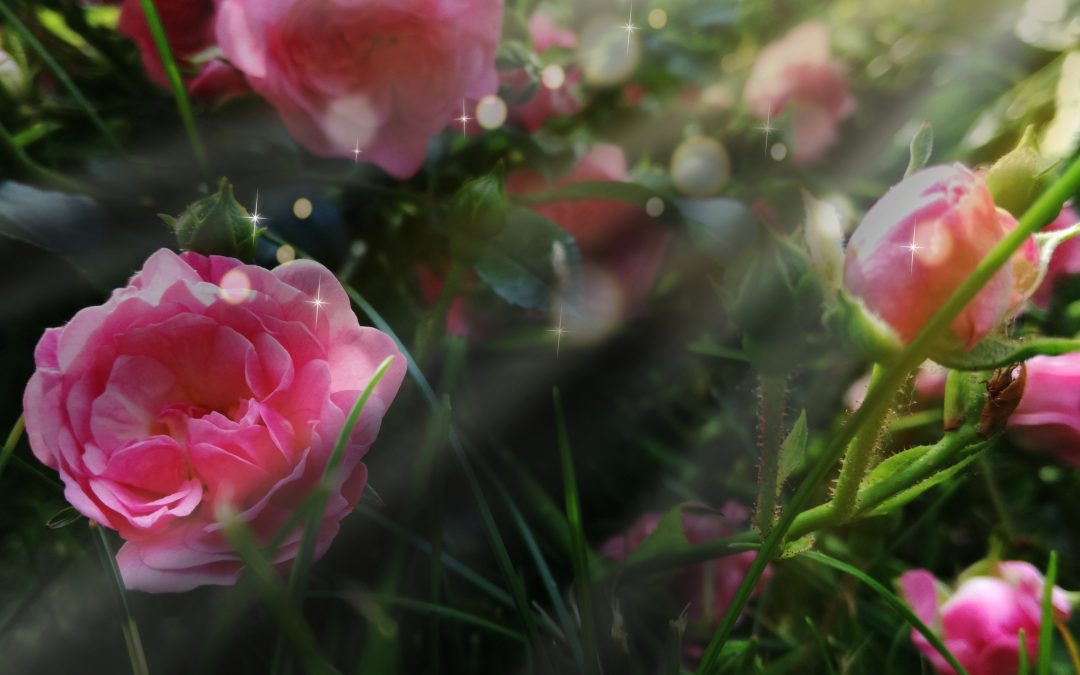I love roses. I love their labyrinthine petals, their careless beauty, their mysterious, glowing hearts. I love their generous perfume, the sovereign power of their thorny stems.
The very first rose bush I planted was a variety called Fragrant Cloud. A gorgeously elegant hybrid rose with dark red-orange petals, it had a distinctive, spicy-sweet perfume that settled on my suburban garden like a benediction.
I loved it so much that I scoured my local nursery for other scented roses, hauling them home in the trunk and back seat of my Volvo. By the end of that summer, the palms of my hands were blistered from digging and planting, and the sunny side of my quarter-acre garden was a riot of multi-hued roses. Creamy headed, velvety red, vibrant orange, pink, lavender, butter-yellow — they quivered in the afternoon breeze, offering their extravagant beauty to honeybees and passing neighbors with equal profligacy.
At the end of each work day, I pottered about my garden for hours, tending to my rose bushes. I watered them and sang to them; attuned to the Rose Deva to get its advice on when and how to plant, to feed, to mulch. I cleared the ground around their roots so they could breathe. I nursed them through bouts of powdery mildew, black spot, and other deadly fungi; released small armies of ladybugs to eat the aphids that would otherwise suck the life out of them.
After a full day of work at my business, pouring out my heart and the contents of my brain to dozens of clients, students and staff, alight with the fine buzz of writing and creating, I returned in the evening to the peace of my garden. I was happy there — a simple, sensual joy that eluded me in the more complex shadows of my family’s home.
The ground under my knees was soft, moist, musky. Crumbling chocolate earth lingered in the crevasses of my hands, and under my fingernails. Sting and sheen of sweat on sunburned arms. Scent of roses, lilies, stocks, layered over, under the sharp green of cut grass. Bees bumbled from shrub to flower, doing their necessary work. The meaty spit and sizzle of barbecue from a neighbor’s yard.
In the lingering light of summer, my boys played outside with their friends until dusk. They ran wildly through gardens and backyards, whooping and laughing, calling out to each other across hedges and from the branches of trees, filling the air with joyful noise.
Everything bloomed, that summer of my first rose garden — my sons and my garden grew tall and strong. My business was thriving too, the excitement of full-on creative fire at the heart of a vibrant community. I was in love with my work, in love with my lanky teenagers with their curious, questing minds, their cracking voices and joyous, generous hearts.
My marriage, on the other hand, was failing. Almost invisibly, at first, it began succumbing to a creeping mildew of the heart that would not reveal itself — not fully — for a few years yet. By which time the damage was terminal, and could not be reversed.
By the third summer of my rose garden, small herds of roving deer began clattering through our neighborhood, driven by new housing development down from the hills that were their natural home. They wandered through my garden at night, trampling the soft ground with their sharp hooves, nipping roses neatly off their stems, depositing mounds of faeces in the garden beds.
They stripped the bark off our apple tree, the one my boys had climbed until they grew too big for its slender branches. Yearling bucks rubbed their budding antlers against the apple tree’s trunk to scratch the uncontrollable itch of new growth. They left the tree weeping sap, vulnerable to opportunistic infections.
One morning, I went out into the garden to find my rose bushes denuded of flowers, their stems broken beyond repair by slashing hooves. The ground beneath them had churned into a muddy gloop, the tops of their roots were gashed and exposed.
I sat with my back against the bleeding trunk of our apple tree, my belly tender, feeling as devastated as my rose garden.
And I cried, grieving the loss of something that didn’t have the strength to survive without heroic outpourings of my time, energy, resources and heart. I asked myself some hard questions. Why was I trying to grow the kind of garden that could not make itself at home in the natural world? What if I oriented myself to belonging, to harmony, wholeness, ease, instead? What would that feel like? What kind of garden would I grow?
I communed with the Rose Deva, and the Devas of my garden, my family, and my home. The truth was undeniable — a compassionate laser cutting through to the heart of the matter.
When any element of an ecology is out of harmony with the whole, it undermines the health and vitality of the entire ecology. Rose bushes whose natural vitality has been bred out of them can no longer contribute to the vibrant life of a garden. Deer driven out of their habitat by human disregard trample and destroy in their attempts to forage for food. A family oriented around one person’s needs and desires, at the expense of everyone else’s, cannot flourish.
That weekend, I dug up the dead rose bushes, and buried them in the compost. Determined that the new garden would grow in harmony with its surroundings, I chose heirloom roses, some of which have been around as a species for hundreds of years. Once established, they are all but indestructible. Unlike hybrids, which are as finicky as greyhounds, these are roses in their (mostly) natural state — vigorous, untameable, vibrantly alive.
Their flowers were small, shaggy, old-fashioned looking. They exuded a perfume that filled my garden with an otherworldly scent like musky angels with petals for wings. Best of all, they flourished happily in my garden, needing very little beyond sun, rain, love, and an occasional pruning.
Instead of spending hours working in my garden each evening, I now had time — to write, to cook my boys their favorite meals, to drive them and their friends to the beach or to the lake for an after-dinner swim, to listen to their stories and their unburdened hearts.
Over the next couple of years, those roses grew into towering thickets that even the deer could not penetrate. They formed a sheltering boundary that made my garden magical — a place out of time where, on long summer evenings, I read, wrote, dreamed a new life for myself and my sons. My boys grew tall too; their world expanded to embrace wider horizons than the small town in which they had grown up.
My older son moved halfway across the world to teach English in China. I finished my novel, which was published internationally. My younger son traveled with me on book tours, where he met people who lived very different lives than anything he’d ever experienced in his Canadian hometown. He returned from these adventures with a new sense of his place in the world, an expanded vision of the possibilities life had to offer.
The day I drove away for the last time — from my marriage, my home, the garden that shone green-and-gold in the evening light — I left with a grieving, grateful heart. In the end, I made the only choice that love would allow.
I’ve never created another rose garden — or any garden, really. My body is aging, and I conserve my energy for that which nurtures wholeness in my life. These days, my love affair with roses blossoms on the beach trails near my home, where wild roses mingle their perfume with the brine of sea air in the summer.
Sustainability, devotion, wholeness — these are the touchstones that guide my choices and form the path beneath my feet. I welcome into my world, and the world of my business, that which brings greater harmony and wholeness. Everything else I bless with love, knowing that it does not belong with me.
This makes choosing what’s mine very simple. I’m a business strategist whose only strategy is not a strategy at all. In everything I do, I choose the unfolding pattern of love, of wholeness.
Living and doing business in this way requires discernment. It also calls for willingness to embrace and act on the truth of my heart, no matter what. The gifts of choosing from this center include the miracle of a business culture that supports me and everyone in the world of my business to live joyfully and to thrive. A culture that contributes to the wholeness and healing of our world.
How about you? What feels out of place or unsustainable in your life? Where are you paying a dizzying price for something that doesn’t belong in your world, or in the world of your business?
And: What path leads you to the heart of what matters most to you? What happens when you follow this path, and give your love and devotion to this holy center?

